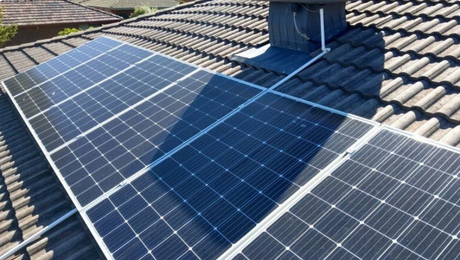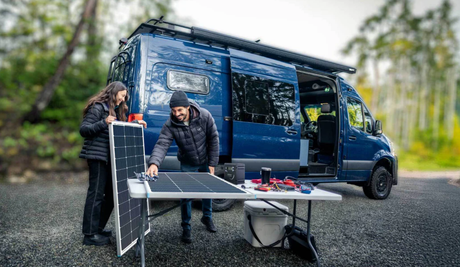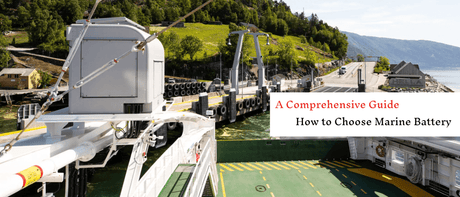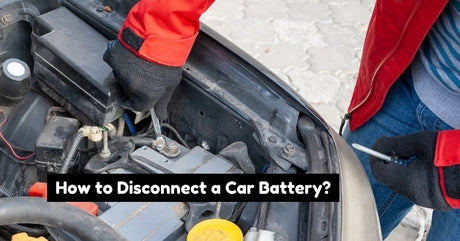There's nothing more frustrating for an RVer than waking up to a cloudy day. While the weather might pause your outdoor plans, the real concern is your solar panel energy output plummets.
The shading problem is very common, almost 90% of users will experience it. This occurs because most solar panels are highly sensitive to shade and clouds. A single shadow from a tree branch or a passing cloud can drastically reduce your power, potentially shutting down your entire solar power system and leaving you without essential energy.
The good news is that unreliable power is no longer a given. This guide will help you find the best solar panels for off-grid life, ones that minimize energy loss and keep your appliances running smoothly, no matter what the weather brings.
Why Standard Solar Panels Struggle with Clouds and Shade
Most standard solar panels are wired in a series circuit. This means the electrical current flows through each cell one after the other, like water through a single hose. Think of a string of old-fashioned holiday lights. If one bulb burns out, the entire string goes dark. Similarly, if just one cell on your solar panel is shaded by a tree branch, antenna, or even bird droppings, it becomes a resistor, blocking the flow of energy and crippling the output of the entire panel or string of panels.
Furthermore, solar panels operate most efficiently under powerful, direct sunlight. While clouds don't block sunlight completely, they scatter and diffuse its energy. This diffusion causes a dramatic drop in performance, often reducing solar power production by 50% or more.
How to Increase RV Solar Panel Efficiency in the Shade
Although you can't stop shadows, you can mitigate their impact. Here’s what you should consider to increase RV solar panel efficiency in the shade:
1. Choose the Right Panel Technology
Your first and best move is to choose solar panels built to handle shade. Look for models that use half-cut cells and advanced bypass technology. For top performance, panels with built-in power optimizers are ideal, as they make each panel work on its own. This means a shadow on one part won’t shut down your whole system.
2. Wire Solar Panels in Smart Way
If you have more than one panel, how you connect them really matters. Avoid connecting them all in a simple series, like old Christmas lights where one bad bulb turns off the whole string. Instead, wire the panels in parallel or series-parallel. In this way, if one panel is shaded, the others can keep producing power at full strength.
3. Upgrade to an MPPT Charge Controller
Ensure you are using a Maximum Power Point Tracking (MPPT) charge controller, not a PWM model. An MPPT controller is far more efficient at harvesting available energy from solar panels. They convert more sunlight into usable battery power, giving you extra energy even when it's gloomy or raining.

4. Park Strategically to Avoid Shade
Sometimes the simplest solutions are the most effective. Before you settle into your campsite, take a moment to check where the sun is moving. Try to park where shadows from trees, your RV’s roof vents air conditioner won’t fall on your solar panels—especially between 10 AM and 4 PM, when the sun is strongest. A small move can make a big difference.
5. Try Portable Solar Panels
Don't forget about portable RV solar kits. These let you place panels in a full-sun location away from the shadows cast by your RV. You can connect them to your RV's system with long cables, effectively turning a shady campsite into a productive one.
6. Keep Your Panels Perfectly Clean
Dust, dirt, pollen, and bird droppings act like a layer of shade. Regularly clean your panels with a soft cloth and mild soapy water. A clean surface is essential for capturing maximum light, especially when sunlight is already limited by weather or shade.
Product Recommendation: Conquer Shade and Cloudy Days with Renogy Shadowflux
Studies reveal that shading from tree branches can cause solar panels to lose up to 64% of their energy output. Even quick changes between sun and shadow can lead to a 56% drop in power. And during early mornings or late afternoons, low sun angles alone can reduce efficiency by 40%.
Unfortunately, these aren't problems you can always avoid, no matter how carefully you install your panels. That's why Renogy created Shadowflux anti-shading solar panel! It delivers off-grid power that ensures reliable energy generation even in the shadow, rain, and snow. It delivers off-grid power that ensures reliable energy generation even in the shadow, rain, and snow.
What makes the Shadowflux solar panel so effective is its advanced anti-shading technology. While a shadow as small as a branch can drastically reduce the output of ordinary panels, the Shadowflux cleverly works around shaded areas. This allows the rest of the panel to keep producing power at full strength. Paired with excellent performance in overcast weather and a durable design made for off-grid life, it captures every bit of energy from rain or shine.

Ideal for avid boondockers, forest campers in regions such as BC or Ontario, and anyone spending long periods off-grid. The Shadowflux conveniently powers essential appliances like fridges and inverters. With Renogy Shadowflux, you can camp with freedom and confidence, no matter where your adventure takes you.
Final Thoughts
So, what's the real benefit of having RV solar panels that work great even when it's cloudy? The answer is freedom. It means you can camp wherever you want, not just where the sun shines, without fear of your electricity running out.
We hope this guide has shown you how possible that is. Ready to experience it for yourself? It’s time to upgrade your RV with Renogy Shadowflux and power your journey toward truly limitless adventure.
Frequently Asked Question
Do RV solar panels work on cloudy days?
Yes, they do! While RV solar panels are most effective in direct sunlight, they can still generate power on cloudy days. Instead of relying on strong and direct rays, they capture the diffuse sunlight that filters through the clouds. The amount of power produced will be 50% or more lower.
However, high-quality solar panels, especially those with advanced technology, are much better at making the most of this limited light, helping to keep your devices running even when the weather isn't ideal.
How long can a solar panel last without sun?
Solar panels themselves don't store power; they only generate electricity when there is some light. The real question is how long your batteries can last without the sun charging them. This completely depends on 3 things: the size of your battery bank, how much power you're using, and how much energy you saved from the last sunny day.
For example, if you're careful and just running some LED lights and a vent fan, your batteries could last a weekend. If you're running a powerful appliance like an air conditioner, it might only last a few hours.
Can solar panels work with moonlight?
Technically, yes, but for all practical purposes, no. The moon simply reflects sunlight, and that light is incredibly faint compared to direct sun. The amount of electricity generated by moonlight is so tiny that it wouldn't even be enough to offset the natural discharge of your batteries.
You would need a massive array of panels to produce a useful amount of power, making it completely ineffective for an RV system. For all intents and purposes, the solar panels will not charge your RV at night.
Are RV solar panels worth it?
Absolutely, for most campers. If you enjoy off-grid camping, boondocking, or even just want to keep your RV batteries topped up between trips, solar panels are a fantastic investment. They provide free, silent, and renewable power, allowing you to avoid searching for a campground hookup or listening to a noisy generator. The initial cost is often outweighed by the freedom and convenience they provide. They truly unlock the potential of your RV.









